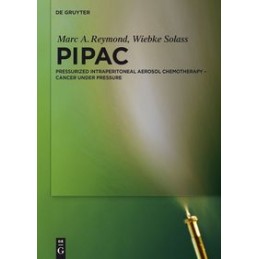- Obniżka


 Dostawa
Dostawa
Wybierz Paczkomat Inpost, Orlen Paczkę, DHL, DPD, Pocztę, email (dla ebooków). Kliknij po więcej
 Płatność
Płatność
Zapłać szybkim przelewem, kartą płatniczą lub za pobraniem. Kliknij po więcej szczegółów
 Zwroty
Zwroty
Jeżeli jesteś konsumentem możesz zwrócić towar w ciągu 14 dni*. Kliknij po więcej szczegółów
Peritoneal dissemination is a common route of cancer metastasis. The benefit of administering chemotherapy directly into the peritoneal cavity is supported by preclinical and pharmacokinetic data. In comparison to intravenous (IV) treatment, intraperitoneal (IP) administration results in a several-fold increase in drug concentration within the abdominal cavity. There is now growing evidence from clinical studies showing a survival advantage for IP chemotherapy in various tumor typies, including ovarian, gastric and colorectal cancer.
However, while the use of IP chemotherapy is slowly gaining acceptance, it is not universal, largely due to the greater toxicity associated with this approach. Moreover, efficacy of IP chemotherapy is limited by poor distribution within the abdominal cavity and by poor tissue penetration.
A new way of IP chemotherapy is the application of cytotoxics in form of a pressurized aerosol into the abdominal of thoracic cavity. Pressurized intraperitoneal aerosol chemotherapy (PIPAC) is applied through laparoscopic access using two balloon trocars in an operating room equipped with laminar air-flow. In a first step,a normothermic capnoperitoneum is established with a pressure of 12 mmHg. A cytotoxic solution (about 10% of a normal systemic dose) is nebulized with a micropump into the abdominal cavity, and maintained for 30 min. The aerosol is then removed through a closed suction system.
Applying an aerosol in the peritoneal cavity allows a homogeneous distribution of the chemotherapeutic agent within the abdomen. Furthermore, an artificial pressure gradient is generated that overcomes tumoral interstitial fluid pressure, an obstacle in cancer therapy. This results in a higher local drug concentration compared to conventional IP or IV chemotherapy. At the same time the plasma concentration of the chemotherapeutic agent remains low.
In first clinical studies with limited number of patients in ovarian, gastric and colorectal cancer, as well as peritoneal mesothelioma, PIPAC has obtained encouraging tumor response rates and survival, with a low-side effects profile. Larger clinical trials are currently ongoing to examine if these data can be reproduced and extrapolated to other situations.
Opis
Indeks: 63866
Autor: Karl-Heinz Schriever
Indeks: 80453
Autor: T. Heather Herdman
Indeks: 35707
Autor: Sarah S. Long
